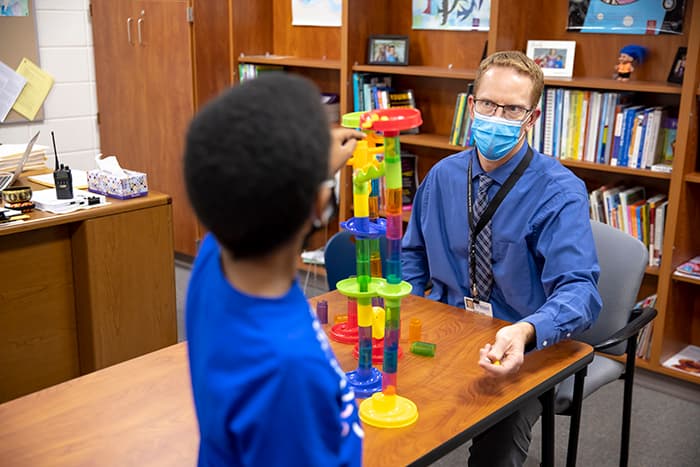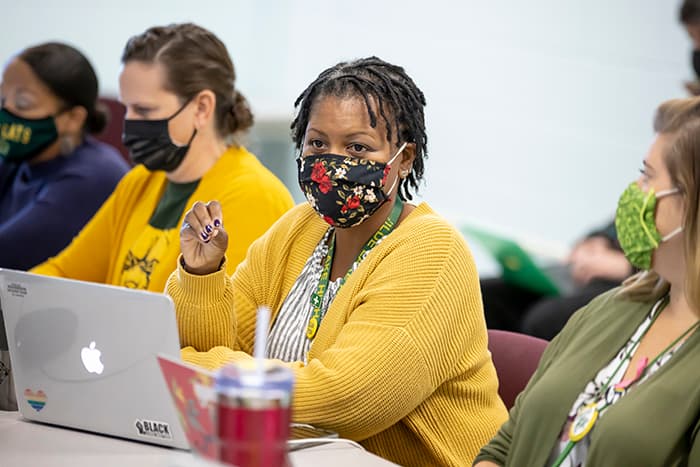School Psychologists: Supporting Student Success through Consultation, Counseling, and Assessment
November 9th, 2021
On any given day, Hanover Hills Elementary School psychologist Jeff Leard may meet with colleagues to discuss how best to support a student with learning disabilities; chat with a student who is having a rough day; observe a classroom to better understand a student’s behavior; administer an assessment of a student’s academic and/or social-emotional skills; and work with a school-based crisis team to provide crisis intervention and training.
“As a school psychologist, my work is definitely varied. Sometimes I’m working with teachers, administrators and counselors; sometimes I’m working with parents; and sometimes I’m working directly with students,” Leard explains. “But no matter who I am working with, my goal is the same: to find ways to support students and help address issues that may be affecting their academic and social-emotional well-being.”

Hanover Hills ES School Pyschologist Jeff Leard works with a student.
Like other school psychologists who work in Howard County schools, Leard’s work falls into three main categories: consultation, counseling, and assessment.
Consultation typically involves providing school staff with support in understanding learning and behavior problems and helping them to identify and implement strategies to promote student success. School psychologists often lead Instructional Intervention Teams (IIT) or are members of the Individualized Education Program (IEP) team, who are tasked with coming up with a plan to address a child’s specific needs.
Typically, this plan begins with extensive observation, says Beth Boyer, a school psychologist at Burleigh Manor Middle School and in one of HCPSS’ Regional Early Childhood Centers (RECC).
“Particularly in my RECC work, I spend much of my time observing students and working with their teachers to determine what is triggering a given behavior. Once we’ve figured out what the trigger is, the teachers and I work together to figure out what we need to do to change the student’s response to it.”
This includes identifying appropriate types of reinforcements for the desired behavior, Boyer says.
“Some students are very motivated by food; others are motivated by praise, access to toys, or particular types of sensory experiences. My job is to help figure out what that motivator is and work with teachers to use it effectively to manage a child’s behavior and enable the child to focus on learning.”
School psychologists also spend much of their time providing counseling services to students. In this capacity, they meet with students to address a particular issue and/or develop a particular skill, such as making a new friend, coping with anxiety, or, more recently, managing the many challenges brought about through the pandemic.
As Wilde Lake High School psychologist Dr. Chandra McKnight-Dean notes, “Our students have never lived through a pandemic before. As school psychologists, we are there to help support them as they deal with the stress and fear and uncertainty that COVID has generated. We provide them with a safe, supportive environment to express how they are feeling, and we help them figure out strategies and connect them with resources to enable them to cope with all that they are trying to juggle right now.”

Dr. Chandra McKnight-Dean, Wilde Lake HS school psychologist, meets with teachers.
Assessment is yet another key component of school psychologists’ work. Assessment involves the administration of formal examinations to determine a student’s skill level or aptitude in a given area. Assessments can be used to identify educational challenges like attention deficit hyperactivity disorder (ADHD) and autism as well as emotional disabilities like depression and bipolar disorder.
As Dr. Cynthia Schulmeyer, HCPSS’ Coordinator of Psychological Services, notes, “Assessments are often recommended as part of a student’s IEP or 504 plan. School psychologists administer these tests and then, pending the test outcomes, also provide the psychological services needed to address whatever issue(s) the tests bring to light.”
In addition to their involvement in HCPSS’ K-12 schools, school psychologists work in HCPSS’ early intervention program, which serves children ages birth to five and their families. In that capacity, they conduct assessments to determine eligibility for early intervention services and work with teams of providers (i.e. occupational therapists, speech therapists, physical therapists, and others) to coach families on how to address their child’s needs.
“While school psychologists tend not to serve as the primary provider in these circumstances, we are there to help if there are behavioral issues that need to be addressed,” explains Dr. Marla Gibson, who is part of HCPSS’ early intervention assessment team. “We also serve as a resource to families who may have questions or concerns about such topics as autism. We help them understand what autism is and how we can support them if that is an issue that their child faces.”
“We have a no-wrong-door approach. If you have a concern about your child’s academic, behavioral, or social-emotional well-being, we want you to come to us. And if we ourselves don’t have the solution, we will work to connect you with people – either within our schools or outside providers – who do.”
—Cindi Schulmeyer, Coordinator, School Psychology
In summary, Schulmeyer says, school psychologists are one of many resources available to help students and families.
Leard agrees: “As school psychologists, our role is to help kids learn and feel comfortable in school. Whether that means observing them to better understand what is triggering a given behavior, administering a test to gain insight into a mental health or emotional challenge they are facing, or providing them opportunities to express themselves and be heard, we are part of the team that is there to provide support.”
In 2021, the HCPSS Office of Psychological Services received the Excellence in School Psychological Services (ESPS) Silver Award from the National Association of School Psychologists. This recognition reflects the commitment and hard work of HCPSS’ school psychologists who support the learning and mental health of all students.
Learn more about psychological services at HCPSS and how to contact the psychologist(s) at your child’s school.
 HCPSS
HCPSS